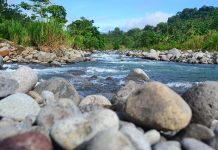Miraflor Joy Austria, project coordinator of Kapwa Upliftment Foundation Inc., raised the alarm that Mt. Apo is now getting bald due to the commercial gardens of cabbage, carrots, and potatoes at the foot of Mt. Apo.

During the press conference of the cacao summit held at the Grand Regal Hotel with Agriculture Secretary William Dar Saturday (August 24), Austria asked Dar to balance the promotion of planting cacao trees over planting of cabbage, carrots, potatoes, and bananas considering that Mt. Apo is a protected area and an ancestral domain of the Bagobo-Tagabawa tribe.
“Kalbo na po at ang makikita ngayon ay gardens of cabbage, potatoes at carrots. Five months ago during the launch of the potato project then Agriculture Secretary Manny Pinol was there and he said okay lang magtanim kayo ng repolyo pero dapat naka-contour or naka hedge-rows dapat repolyo-cacao-kape to balance lang. Hindi naman natin maalis ang mga repolyo growers kasi may mga laborers na doon na dependent na sa mga pananim,” she said.
Austria said there is a need to balance the plantings of cacao and vegetables so not to degrade soil fertility, since these vegetables are dependent to chemicals, it is also risk to erosion.
“Chemicals very no-no in the protected area and ancestral domain. It is in the law at alam ng DA at DENR yan. I was happy with sir Dar’s pronouncement that we can explore ancestral areas for the plantation of cacao. But the challenge in the context of Mt. Apo kalbo na po siya ngayon kasi mas marami ang banana plantations, cabbage and potatoes. Even the DA is distributing potatoes, which is a shortened crop and can enhance risk of landslide,” she said.
She said the bald part of the mountain is visible even from the highway as it is a trekking area going to Mt. Apo. She is hopeful that the DA in collaboration with DENR will address her concern.
“We are willing to assist and we are cooperating with the municipal agriculture kaya lang as an NGO wala po kaming authority to enforce the law. These areas of gardens are owned by private individuals and businessmen. Wala ka ng makitang kahoy puro na vegetables gardens,” she said.
On his end, Dar cited an agency should implement the law not allowing farming in Mt. Apo as it is a natural park.
“Ang problema sa Pilipinas palagi may batas tayo, may regulasyon tayo hindi naman pinapatupad. Yun ang problema ng gobyerno. National park yun, dapat walang farming. No touch dapat. Titingnan mo lang ang national park para ang kagandahan niya ya ma-maintain pero ang daming nagsasaka na at ang ibig sabihin hindi ginagampanan nung ahensiya na dapat nag protekta sa Mt. Apo,” Dar said.
Dar also recommended for cacao and other fruit tree crops to be part of the agro-forestry in the mountains.
Kapwa Upliftment Foundation Inc. is a 40-year old non- profit organization advocating for the promotion of agro-forestry in Mt. Apo protected area and ancestral domain. The group is also promoting cacao and coffee and abaca.
“Originally Kapwa is assisting Bagobo-Tagabawa tribe for their ancestral domain. We lobby to the National Commission on Indigenous Peoples, help them with formulation, and the production of agro-forestry. Halos lahat ng areas ng Davao de Sur naabot na namin and the latest is Bansalan,” she said.
She said currently, there are 1,000 farmers composed of Bagobo-Tagabawa tribe and the locals. Some of their farmers already converted from planting cabbage to cacao.
One of the organizations formed by Kapwa is the Balutakay Coffee Farmers Association (BACOFA) from being coffee cherry suppliers to becoming post-harvest coffee processors and now they have become green coffee bean exporters.
“After planting we help the farmers formed into a people’s organization like and we teach them collective marketing which means sabay silang mag harvest, hanapan namin ng buyers at walang piso na papasok sa Kapwa lahat ay sa kanila to generate individual income at the same time the organization will generate income,” she said.
Kapwa does not give financial assistance but more on technical, provide seedlings like cacao from DA, farm tools, and organizes farmers into a self-help group.






